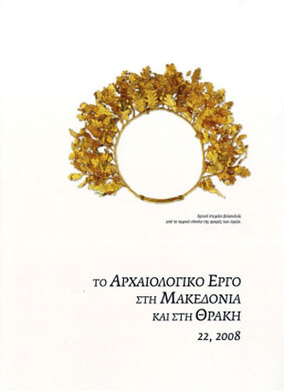Η ρωμαϊκή θρησκεία στη Μακεδονία
Part of : Το Αρχαιολογικό Έργο στη Μακεδονία και στη Θράκη ; Vol.15, No.1, 2001, pages 47-54
Issue:
Pages:
47-54
Parallel Title:
The roman religion in Macedonia
Author:
Abstract:
In November 2000 the German Research Institute based in Bonn approved a research project titled “The Roman Religion in the Empire and its Provinces”. The project is divided into a number of units, which deal with the phenomenon of the Roman religion and its presence, imposition, and assimilation in the provinces of the Empire, including Macedonia. It focuses mainly on religious history and literature, though without overlooking the importance of archaeological investigations in order to gain a global view of the subject. The study of Macedonia has been assigned to the University of Erfurt, with special reference to Samothrace.The aims of the project are: i. to make a new approach to the religious history of the region based on the relationship between the centre and the periphery, the capital and the provinces, on the interplay of acceptance and rejection of ideas, on what was offered and the choices available to the recipients; ii. to develop a specific theory regarding the processes and means of transmitting the religious element; and iii. to understand Macedonia as a political and cultural entity in comparison and in association with neighbouring areas.The method employed is based on: i. a study and evaluation of the written sources (i.e. the literary sources, inscriptions, and coins); and ii. utilisation of the findings of archaeological investigations on correlated archaeological sites with regard both to buildings and structures and to movable finds.It was clear from the start that the investigation, which relates to an extensive geographical area, could produce results within a certain time frame only if it were restricted to specific areas where Roman and native data documented by a wide range of sources can be discerned. From the earliest stage, the investigation focused on a sampling survey of major urban and religious centres, which stand out for their demographic composition, their cultural and religious influence on the surrounding areas, and their geopolitical location.The determining factor in the religious developments is not increase or change in the local list of deities. It is much more important to observe the continuity of the religion and the changes in its agents over an extensive period of time and the resulting new groupings and to be aware of alternative interpretations. By also comparing the findings of studies of other sample cities, we can immediately see the benefits of this approach with regard to both the specific subject and the basic nucleus of the research project as a whole.
Subject (LC):
Keywords:
Μακεδονία, ρωμαϊκή θρησκεία




